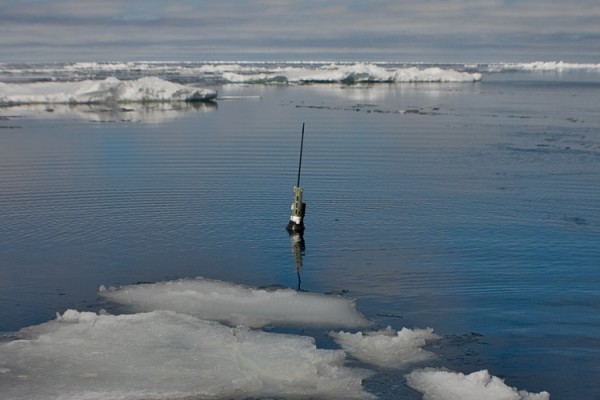By Ana Verayo, | January 05, 2017
- PREV
- Image1of0
- NEXT
In the past few years, numerous studies have debunked the idea that global warming reached a "pause" or hiatus, as surface temperatures began to decrease between 2000 to 2010. Now, a new study confirms that a global warming pause never happened.
Many experts and scientists have debated if this "pause" truly occurred based on crucial evidence. On June 2015, the National Oceanic and Atmospheric Administration (NOAA) published a paper in the scientific journal, Science, where the U.S. agency slightly revised sea surface temperatures since it had not been changed or updated since the 1900s.
Like Us on Facebook
The NOAA also revealed that its measuring methods were flawed

A NEMO float, part of the global Argo array of ocean sensing stations, deployed in the Arctic from the German icebreaker Polarstern Bremerhaven
and that they were based on the engine intake ports found in ships' sensors. When NOAA scientists finally revised their methods, they found out that sea surface temperatures since the 2000s were slightly higher than first reported.
When the NOAA made the adjustments of both records, scientists obtained real measurements that confirmed how temperatures back in 2000 were truly higher than previous decades due to flawed methodology. This also means that no hiatus took place.
Experts and critics attacked the NOAA by saying that the agency "cooked the books" to dismiss this climate change claim. U.S. Congressman Lamar Smith of Texas (R-TX) launched an investigation to further probe the NOAA and even demanded that the agency surrenders its emails. The NOAA did not comply with this demand.
In a new study released this week, a group of independent scientists investigated this NOAA study once more and detailed how the NOAA measurements adjustments were justified and legitimate.
A team from the University of California, Berkeley and the University of York analyzed raw data obtained buoys, satellites and robotic sensors that are located around the planet's oceans. The team concluded that old methods used by NOAA truly overestimated sea surface temperatures in the past and that new measurements underestimated temperatures for 2000 and beyond.
According to Zeke Hausfather of UC Berkeley, the bottom line here is that NOAA finally got it right after adjustments and they are not manipulating data for any political purpose. Global warming and climate change continue and there was never a "pause."
This new study was published in the journal, Science Advances.
-
Use of Coronavirus Pandemic Drones Raises Privacy Concerns: Drones Spread Fear, Local Officials Say

-
Coronavirus Hampers The Delivery Of Lockheed Martin F-35 Stealth Fighters For 2020

-
Instagram Speeds Up Plans to Add Account Memorialization Feature Due to COVID-19 Deaths

-
NASA: Perseverance Plans to Bring 'Mars Rock' to Earth in 2031

-
600 Dead And 3,000 In The Hospital as Iranians Believed Drinking High-Concentrations of Alcohol Can Cure The Coronavirus

-
600 Dead And 3,000 In The Hospital as Iranians Believed Drinking High-Concentrations of Alcohol Can Cure The Coronavirus

-
COVID-19: Doctors, Nurses Use Virtual Reality to Learn New Skills in Treating Coronavirus Patients







